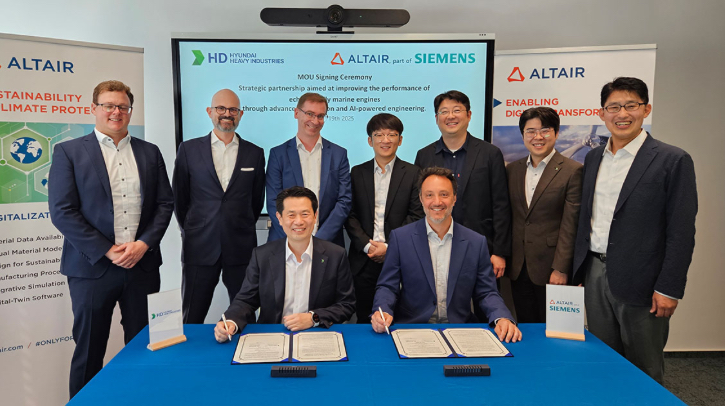Computational intelligence company Altair has signed a memorandum of understanding (MOU) with the Engine Research Institute at HD Hyundai Heavy Industries to improve the performance of eco-friendly marine engines and power AI-driven development initiatives.
AI for eco-friendly marine engines
Under the agreement, Altair and HD Hyundai Heavy Industries will collaborate to: develop simulation platforms for eco-friendly marine engine design and optimization; use AI-powered technologies for improving engine performance; conduct predictive maintenance and diagnostics capabilities; and enhance engine safety through AI-based visualization technologies.
With this collaboration, Altair will actively support HD Hyundai Heavy Industries in advancing eco-friendly marine engines and delivering results in areas such as design efficiency, reduced development cycles and performance enhancement. Altair is expected to contribute to improvements in design efficiency, shorter development cycles and enhanced performance by leveraging synergies with Siemens’ industrial software technologies.
Strategic partnership plan
Altair was recently acquired by Siemens to extend its leadership in simulation and industrial AI. Altair technology is being integrated with the Siemens Xcelerator portfolio.
“This collaboration goes beyond technology development – it is a strategic partnership to shape the future of marine engine development,” said Pietro Cervellera, senior vice president of aerospace and defense at Altair. “By combining Altair’s global technological capabilities with HD Hyundai Heavy Industries’ expertise in eco-friendly marine engines, we aim to set a new standard for sustainable engine and machinery business.”
Sungchan An, PhD, vice president and head of the Engine Research Institute, HD Hyundai Heavy Industries, stated, “HD Hyundai Heavy Industries and Altair have continuously collaborated on the development of simulation technologies for high-quality HiMSEN engine designs. With Altair now part of Siemens, the development of next-generation engine design technologies – such as virtual product development and AI-based engine simulation – is expected to further accelerate.”
In related news, Lloyd’s Register (LR) recently began using generative AI for permitting capabilities built upon Microsoft Azure OpenAI Service. The capabilities are designed to enhance the regulatory process for nuclear technology and will be used by Lloyd’s Register to advance the deployment of nuclear in maritime applications. Click here to read the full story



